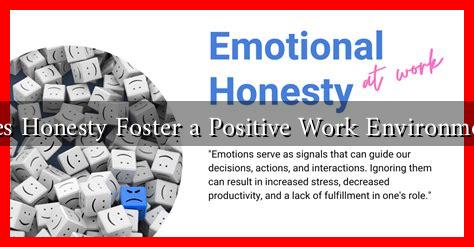-
Table of Contents
Does Honesty Foster a Positive Work Environment?
In today’s fast-paced corporate world, the importance of a positive work environment cannot be overstated. A workplace that fosters trust, collaboration, and open communication is essential for employee satisfaction and productivity. One of the key elements that contribute to such an environment is honesty. This article explores the relationship between honesty and a positive work environment, supported by research, examples, and statistics.
The Role of Honesty in the Workplace
Honesty in the workplace refers to the practice of being truthful and transparent in communications, actions, and decisions. It encompasses various aspects, including:
- Open communication between employees and management
- Transparency in decision-making processes
- Accountability for actions and decisions
- Integrity in interactions with colleagues and clients
When honesty is prioritized, it creates a culture of trust, which is foundational for a positive work environment. Employees feel valued and respected, leading to higher morale and engagement.
Benefits of Honesty in the Workplace
Research has shown that honesty can significantly impact workplace dynamics. Here are some key benefits:
- Enhanced Trust: When employees perceive their leaders as honest, they are more likely to trust them. A study by the American Psychological Association found that trust in leadership correlates with employee satisfaction and retention.
- Improved Collaboration: Honesty fosters open communication, which encourages collaboration among team members. A collaborative environment leads to innovative solutions and improved problem-solving.
- Increased Employee Engagement: Employees who work in an honest environment are more engaged. According to Gallup, organizations with high employee engagement levels outperform their competitors by 147% in earnings per share.
- Reduced Conflict: Honesty minimizes misunderstandings and miscommunications, which are often the root causes of workplace conflicts. A transparent environment allows for quicker resolution of issues.
Case Studies: Honesty in Action
Several organizations have successfully implemented honesty as a core value, leading to positive work environments. Here are a few notable examples:
- Buffer: This social media management platform is known for its radical transparency. Buffer shares its revenue, salaries, and even its decision-making processes with employees. This openness has fostered a culture of trust and collaboration, resulting in high employee satisfaction.
- Patagonia: The outdoor clothing company emphasizes honesty in its environmental practices and business operations. By being transparent about its supply chain and sustainability efforts, Patagonia has built a loyal customer base and a motivated workforce.
- Salesforce: Salesforce promotes a culture of honesty through its “Ohana” philosophy, which emphasizes family and community. The company encourages open dialogue and feedback, leading to a supportive work environment that drives innovation.
Challenges to Honesty in the Workplace
While honesty is crucial, it is not without its challenges. Some common obstacles include:
- Fear of Repercussions: Employees may hesitate to speak the truth due to fear of negative consequences, such as job loss or retaliation.
- Cultural Norms: In some organizations, a culture of silence prevails, where employees feel pressured to conform rather than express their honest opinions.
- Lack of Leadership Support: If leaders do not model honesty, employees are unlikely to feel comfortable being honest themselves.
Conclusion: The Path to a Positive Work Environment
In conclusion, honesty is a fundamental pillar of a positive work environment. It enhances trust, improves collaboration, increases employee engagement, and reduces conflict. Organizations that prioritize honesty not only create a supportive atmosphere but also drive better business outcomes. However, fostering honesty requires commitment from leadership and a willingness to address the challenges that may arise. By embracing honesty, companies can cultivate a thriving workplace where employees feel valued and motivated to contribute their best.
For further reading on the importance of honesty in the workplace, you can explore resources from the American Psychological Association and Gallup.

